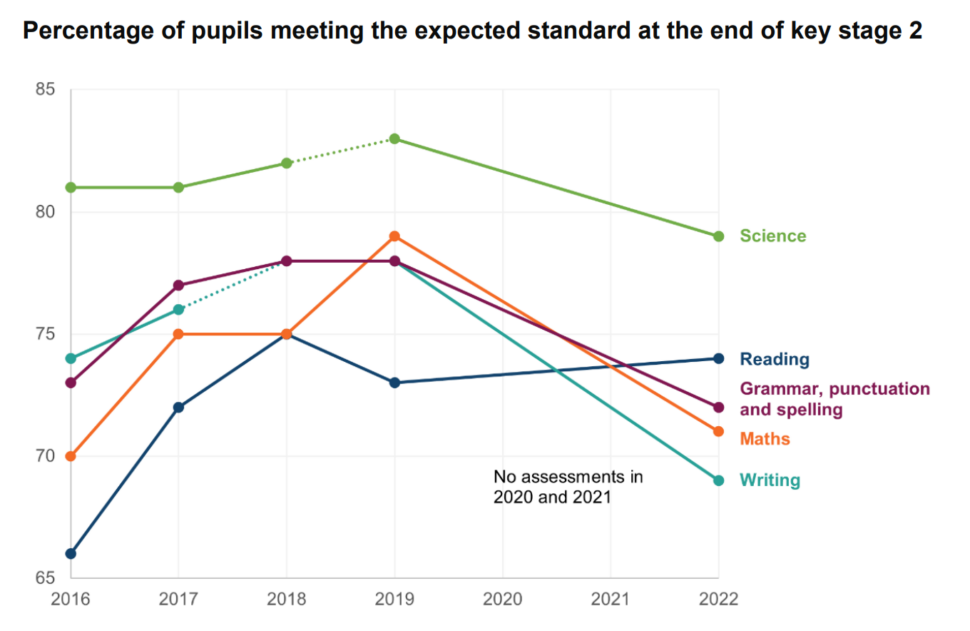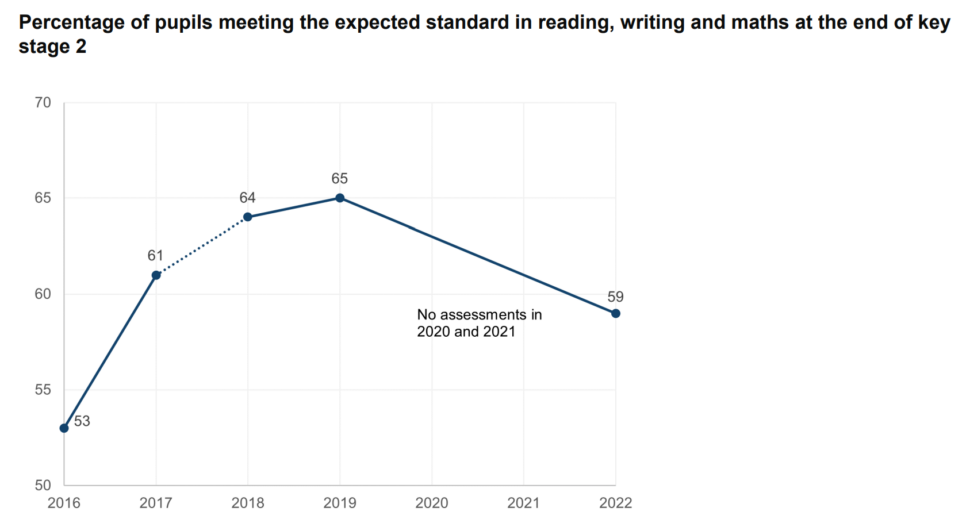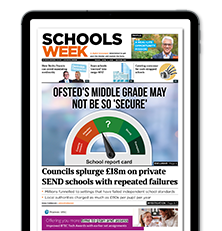Fifty-nine per cent of pupils achieved the government’s “expected standard” in reading, writing and maths in this year’s key stage 2 SATs, down from 65 per cent in 2019 and the lowest since 2016.
Interim results published by the government this morning show that the proportion of pupils reaching a scaled score of 100 or more fell in every discipline except reading, where it rose by 1 percentage point from 73 to 74 per cent.
In maths, the proportion meeting the expected standard fell from 79 per cent in 2019 to 71 per cent this year. And the proportion reaching the standard in writing fell from 78 per cent to 69 per cent.
In grammar, punctuation and spelling, the proportion meeting the expected standard fell from 78 per cent to 72 per cent. Meanwhile 79 per cent met the threshold in science, down from 83 per cent in 2019.

Achievement in the three main disciplines this year was the lowest level seen since 2016, when 53 per cent met the expected standard. However, the government said attainment was “not directly comparable” with 2016 and 2017 because of a change to writing tests.
It follows over two years of disruption to education, and represents the results of the first formal tests sat by primary pupils in three years.
It leaves the government even further away from its recent white paper and levelling up target for 90 per cent of children by 2030 leaving primary school with the expected standard in reading, writing and maths.

SATs results ‘disappointing but expected’, says Walker
Schools minister Robin Walker said the drop in overall achievement in reading, writing and maths was “disappointing”, but “expected due to the impact of the pandemic”.

He said the rise in reading attainment, coming “despite the disruption of Covid”, was a “tribute to the hard work and dedication of our teachers, pupils and parents”.
“Attainment in maths and in writing, however, are disappointing, but not unexpected.”
Walker said the government would be working to “understand the detail beneath these figures”, and more statistics in September would include breakdowns by region, local authority area and pupil characteristics.
He also defended the move to hold SATs this year without adaptations, “so that we can have a consistent measure of attainment before and after the pandemic”.
No school-level key stage 2 data will be published in school league tables, but it will be shared with schools trusts and councils to “inform school improvement and support school leaders”.
“We will ensure clear messages are placed alongside any data shared to advise caution in its interpretation.”
Caution urged over drawing conclusions
NAHT leaders’ union general secretary Paul Whiteman urged caution over the “conclusions we draw” from the results.
“The disruption caused by Covid impacted children in many different ways, with some families and school communities hit far harder than others. This means that attempts to compare SATs results between schools is a pointless endeavour.”
But he said the national data showed the government needed “to do more to support schools with childhood and educational recovery of our nation’s young people”.
Schools Week reported that heads faced long delays accessing their schools’ results this morning, after a portal run by Capita on behalf of the government crashed.
The government also published the marks pupils needed for the 2022 key stage 2 tests to achieve its “expected” scores. You can read about them here.
Analysis shows attainment drop at KS1 too
Analysis by FFT Education Datalab of key stage 1 results from 620 schools that provided data for both 2019 and 2022 found similar drops in attainment in certain disciplines.
The proportion reaching the expected standard in writing fell from 70 per cent to 59 per cent, with smaller decreases in reading and maths. The analysis also suggests that attainment fell among summer-born girls more so than other groups.
Pupils currently at the end of key stage 1 started school in September 2019, meaning all three of their first years of school have been disrupted by Covid.
















How can the government publish results when SATs papers are missing and some enlarged papers haven’t been marked?!?